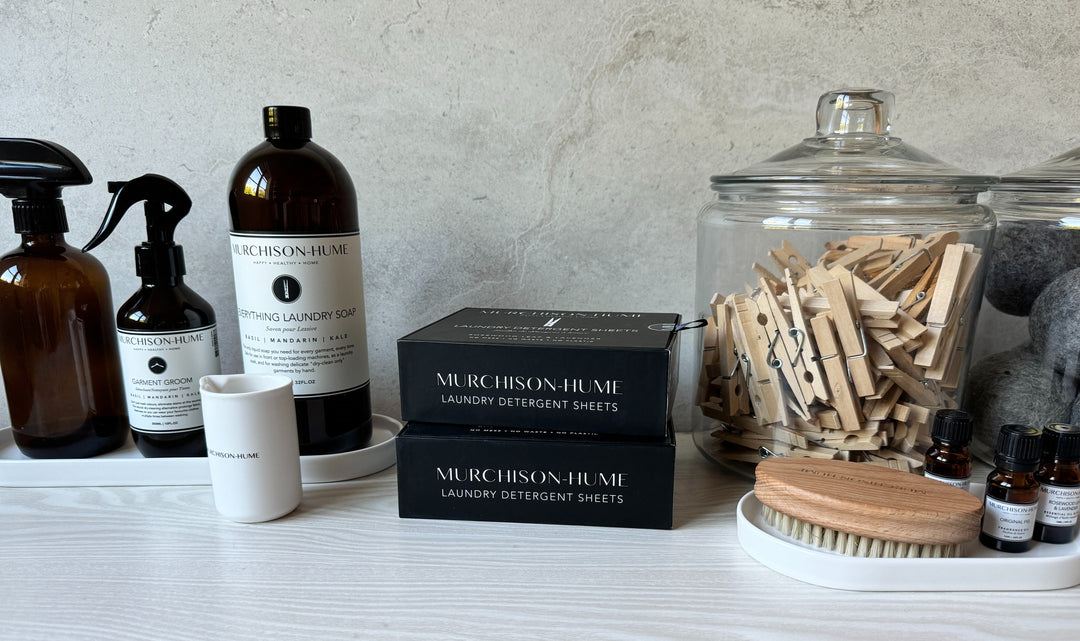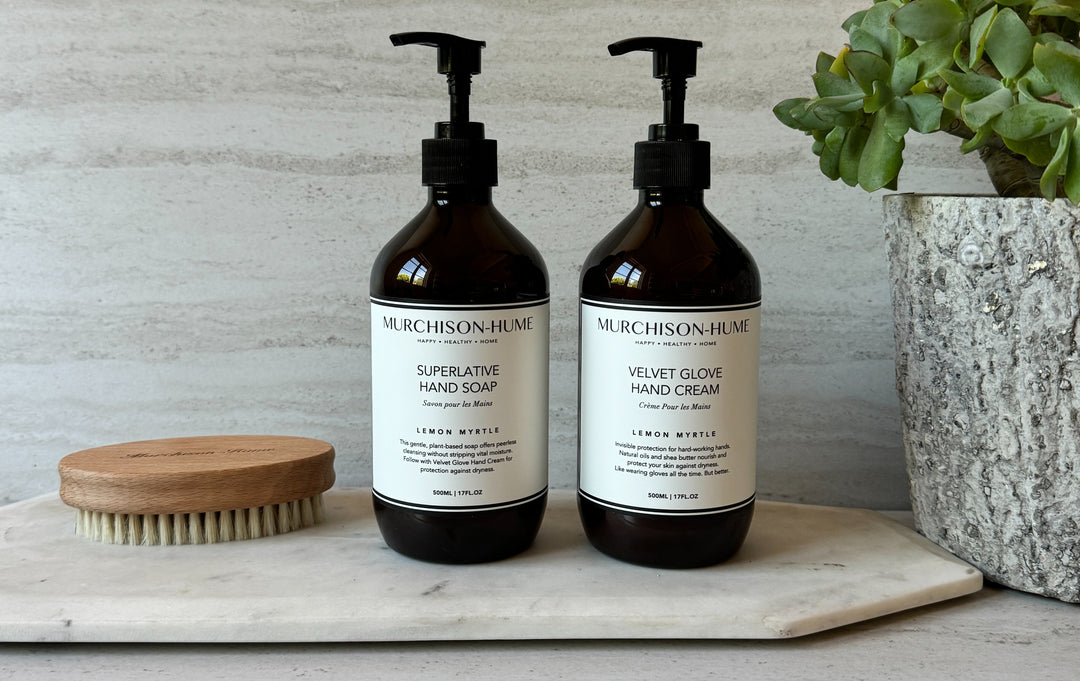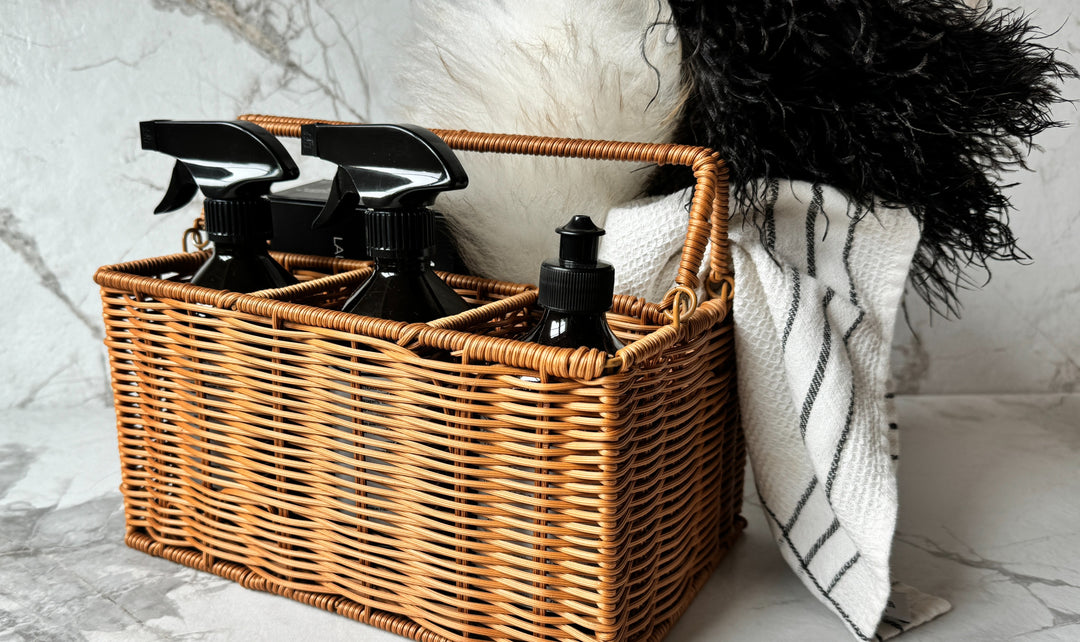|
This article was originally published on Air Mail, for the full read, click here.
|
The other day, I got down on my hands and knees to polish my floors.
What inspired me was a bottle of Supernatural Wood + Floors cleaner. “Your floors are the root chakra of your home,” says Suzy Batiz, the inventor of Supernatural. Batiz’s chakra cleaner is pumped with some of the same essential oils used in aromatherapy (lavender, basil, rosemary, fir), so I inhaled deeply and pretended I was at a spa. I was not just buffing away smudges and who knows what; I was, according to Batiz, “cleansing the foundational stability of your home and sanctuary.”
With enough style and intention, everyday tedium can become a self-care ritual and even a mental-health hack. That’s what psychologists, life coaches, and Adam Grant have been preaching lately as an antidote to malaise. They advise us to focus on the little things that set up the day for success: make your bed, clean your kitchen, do your laundry, they nudge, sounding remarkably like our mothers.
I may not be flourishing, but my floors certainly are.
In that spirit, home-cleaning products are getting a glow-up, taking inspiration from the land of makeup, skin care, and fine fragrance. Courteney Cox—with Nick Axelrod-Welk, co-founder of Nécessaire, the handsome body-care line, and Sarah Jahnke, who toiled in L’Oréal’s luxury-fragrance division—just introduced a collection of dish soaps, counter cleaners, and hand washes called Homecourt. (A room spray will be released in April.) Cox describes them as “beauty products for the home.”
The bottles are deep-green, post-consumer recycled plastic; the formulas are tested by a dermatologist; and each product comes in one of four scents concocted by perfumers from Givaudan (known for Tom Ford Black Orchid) and Robertet (creators of various Bond No. 9 fragrances).
I’ve never been tempted to spritz Lysol Basin Tub & Tile onto my pulse points, but I’m having a hard time resisting the urge to bathe in Homecourt’s Neroli Leaf dish soap. (Confession: I couldn’t resist. This morning, I used Homecourt’s dish soap as a shower gel, and I now smell like a garden in Morocco.) “I wouldn’t use the surface spray as a face wash,” says Cox. “But it won’t wreck your skin.” My skin survived the dish-soap shower remarkably unwrecked.
The founder of Murchison-Hume, Max Kater, was early to this movement when, 15 years ago, she started mixing her own plant-based cleaning products and decanting them into amber-colored apothecary bottles. “Cleaning products needed a makeover,” says Kater, echoing the words of cosmetics salespeople and the luminaries of HGTV.
“Once I realized that the lemon scent in products is fake, I thought, Why not make it smell like something you want to put on yourself?” says Kater. “The American market loves a big bloom and a big scent, but the last thing I wanted was for someone to walk into a room and be hit over the head with fragrance. I wanted the products to have a lingering trail of scent.” It almost sounds poetic.
The Murchison-Hume cleaners—for bathrooms, glass, dishes, and laundry—come in various bucolic fragrances, including fig, quince, cedarwood, mandarin, and lemon myrtle. The designer Jenni Kayne collaborated on a dish soap that smells, according to Kater, like Ojai. Kayne sells it alongside her chunky sweaters and suede mules.
There’s a sense of cool to these products, and a notable absence of the drudgery suggested by scrubbing bubbles, “10x Cleaning Actions,” or Windex blue.
The territory is ripe for entrepreneurs. Batiz, whose success with Poo-Pourri, an odor-masking toilet spray, landed her on Forbes’s list of America’s richest self-made women in 2019, spent two years and close to $2 million exploring natural alternatives to traditional cleaning solutions for Supernatural. To illustrate the challenge, Batiz relays the story of a fragrance supplier who proposed cherry and bubblegum scents for Poo-Pourri, “the horrible, pink gas-station-bathroom stuff,” she says. “If you don’t push them to think differently, then they won’t.”
Perhaps it goes without saying that Kris Jenner jumped into the game last year with a line of home-cleaning products in cheerful green plastic bottles, called Safely. (And, yes, I’m proud that it’s taken me more than half the length of this story to include this fact.) Safely is sold at Walmart and Bed Bath & Beyond, yet in an interview with Adweek, she called the products “luxurious.” “It’s the smell,” she said. “It just feels like a very elegant product.”
The transformative power of fragrance propels these new products into the wellness category, something that’s supported by actual science. In one study led by a Brigham Young University professor, researchers found that the smell of a citrus-scented cleaner can actually increase virtuous behavior. In other words, as the university summed up in a headline: “Cleanliness IS next to godliness.”
To explain the higher purpose of their dish soaps, some of these founders turn to concepts from Buddhism, mindfulness, and self-help. “If you have to do it, why not make cleaning more of an experience?” asks Cox. Batiz believes, “If you invest in this cleaner, the rewards are different than just having a clean house.”
Batiz, Jenner, and Cox all refer to housecleaning as “the new self-care,” which may sound farcical, but I get it. Over the past two-plus years of work (and everything else) from home, our living rooms, kitchens, and bedrooms have become an extension of the self. Every Zoom meeting provided a view into our private sanctuaries. And between meetings, we popped in our AirPods and scrubbed. “I’ve never spent more time cleaning a counter in my whole life,” says Cox.
We have Martha Stewart, our most glamorous home-ec teacher, to thank for the fetishization and, more importantly, the monetization of housework. “I was serving a desire—not only mine, but every homemaker’s desire, to elevate that job of homemaker,” she once said, explaining her early motivation. “We all wanted … to pay somebody else to do everything that we didn’t think was really worthy of our attention. And all of a sudden I realized: it was terribly worthy of our attention.” And with that, she turned glamorous home ec into a multi-million-dollar empire.
That’s the hope of these new home-cleaning entrepreneurs. Take a dreary business; remove the bad (toxins, plastic, harsh scents, screamy labels, tacky colors); add dermatologist-tested ingredients, aromatherapy oils, and sophisticated fragrances; pour them into sleek bottles with quirky fonts; and … voilà! Desire, romance, goodness, serenity. As Batiz explains, “When I walk through my house and smell that wood-floor cleaner, everything in my being shifts.”







